Unit 2 Topic 1 You should brush your teeth twice a day Section D课件(共25张PPT)
文档属性
| 名称 | Unit 2 Topic 1 You should brush your teeth twice a day Section D课件(共25张PPT) | 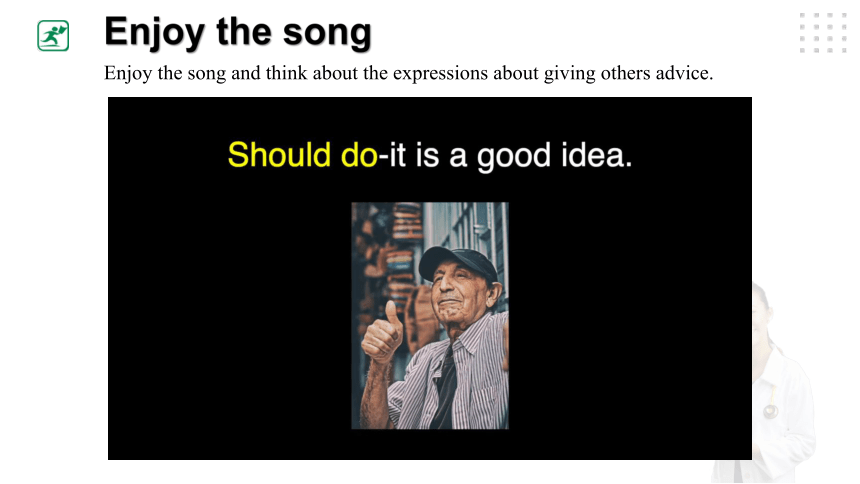 | |
| 格式 | pptx | ||
| 文件大小 | 23.6MB | ||
| 资源类型 | 试卷 | ||
| 版本资源 | 仁爱科普版 | ||
| 科目 | 英语 | ||
| 更新时间 | 2022-09-19 23:22:29 | ||
图片预览

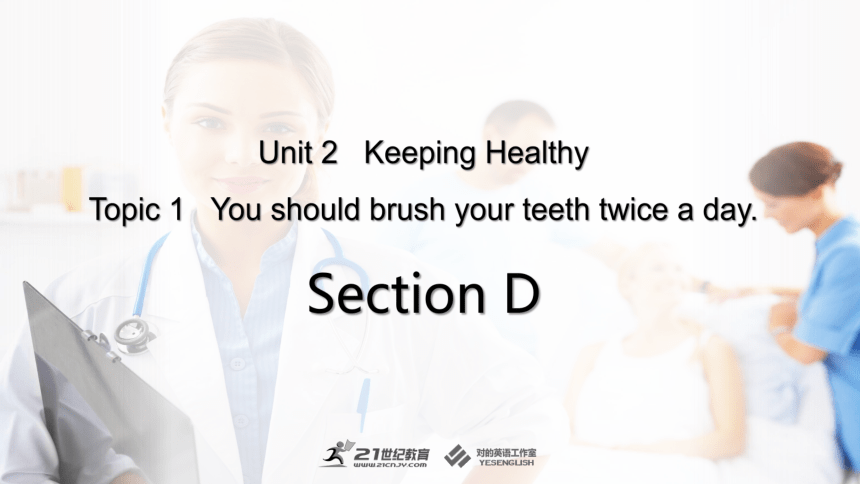
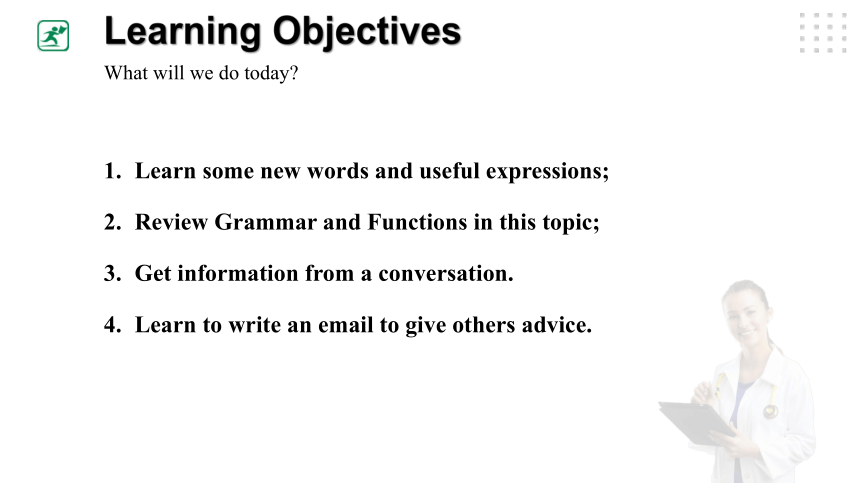
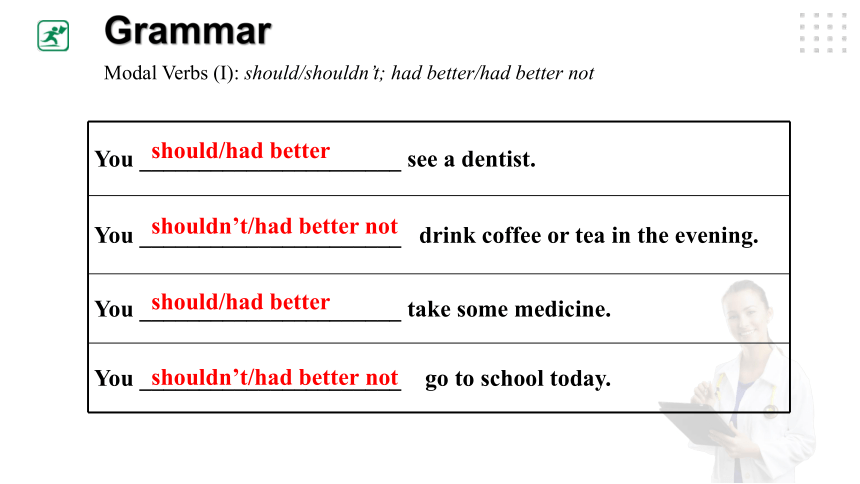
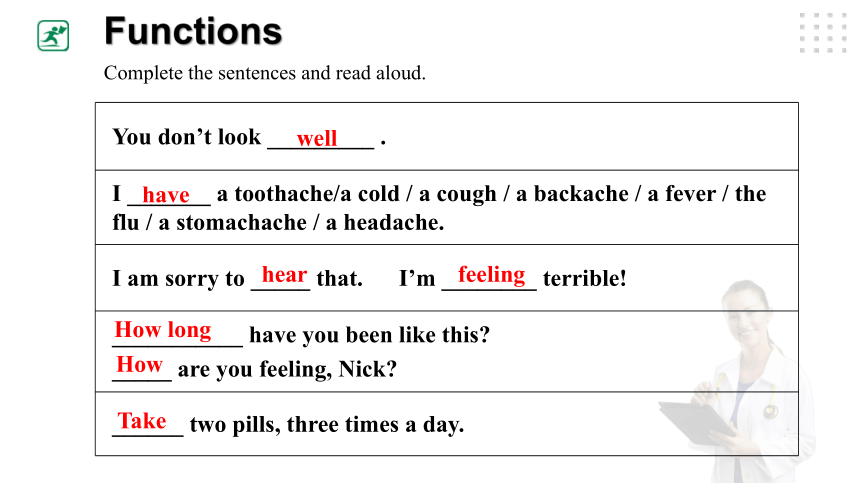

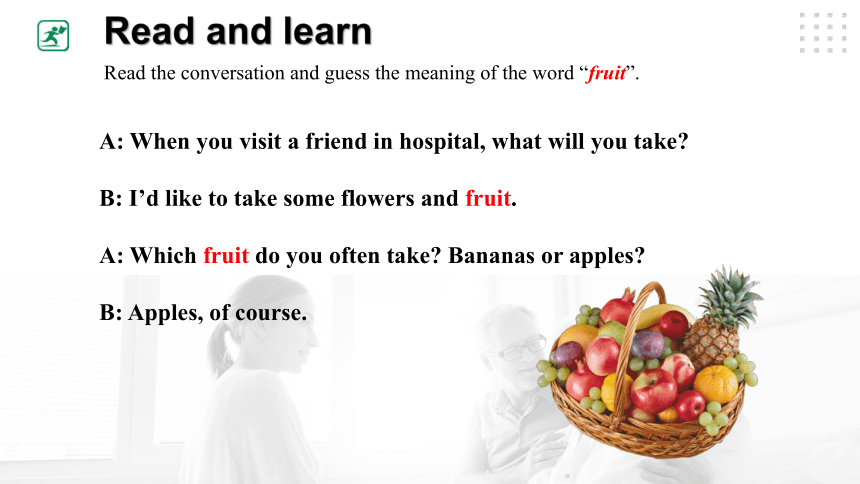
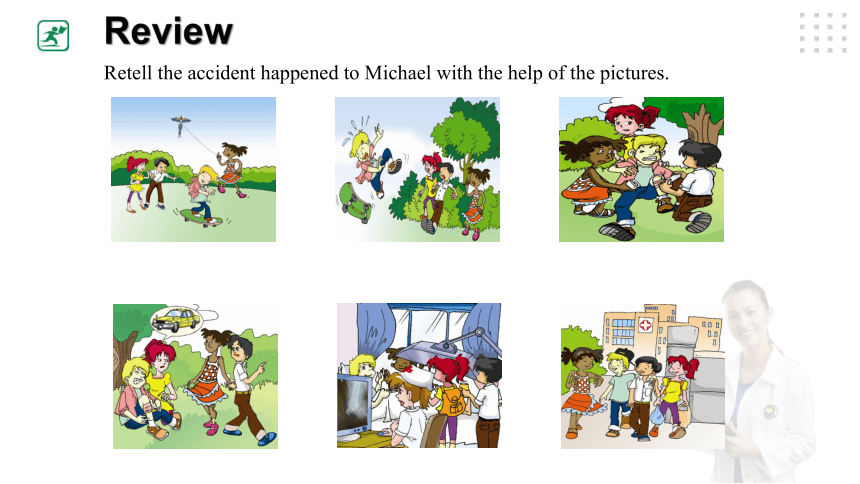
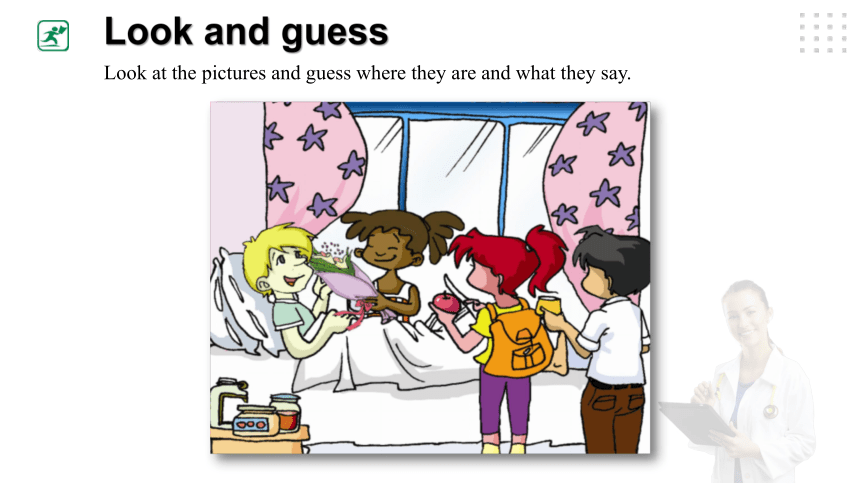
文档简介
(共25张PPT)
Enjoy the song
Enjoy the song and think about the expressions about giving others advice.
Unit 2 Keeping Healthy
Section D
Topic 1 You should brush your teeth twice a day.
Learning Objectives
What will we do today
Learn some new words and useful expressions;
Review Grammar and Functions in this topic;
Get information from a conversation.
Learn to write an email to give others advice.
Grammar
Modal Verbs (Ⅰ): should/shouldn’t; had better/had better not
You ______________________ see a dentist.
You ______________________ drink coffee or tea in the evening.
You ______________________ take some medicine.
You ______________________ go to school today.
should/had better
shouldn’t/had better not
should/had better
shouldn’t/had better not
Functions
Complete the sentences and read aloud.
You don’t look _________ .
I _______ a toothache/a cold / a cough / a backache / a fever / the flu / a stomachache / a headache.
I am sorry to _____ that. I’m ________ terrible!
___________ have you been like this
_____ are you feeling, Nick
______ two pills, three times a day.
hear
have
feeling
How long
How
Take
well
Look and learn
Look at the picture and learn some new words.
It’s getting dark.
He still sat by the still lake.
Maybe he was worried about something.
Can you give him some advice
Read and learn
Read the conversation and guess the meaning of the word “fruit”.
A: When you visit a friend in hospital, what will you take
B: I’d like to take some flowers and fruit.
A: Which fruit do you often take Bananas or apples
B: Apples, of course.
Review
Retell the accident happened to Michael with the help of the pictures.
Look and guess
Look at the pictures and guess where they are and what they say.
Listen and mark
Listen to 1a and mark T(True) or F(False).
Michael’s right leg still hurts when he moves it. ( )
Michael’s friends brought some food and fruit for him. ( )
Kangkang asked Michael not to move his leg too much. ( )
Michael had better stay in bed and have a rest. ( )
Michael’s friends will help him with his lessons. ( )
F
F
F
T
T
Listen and complete
Listen to 1 again and complete the conversation.
M, J & K: Hey, Michael. How are you feeling today
Michael: Not too bad. But my left leg still hurts when I move it.
Oh, thank you ______ your flowers and fruit.
Kangkang: Don’t worry! Your X-rays show it’s _______ _______.
Maria: You ______ _____ stay in bed and not move your left leg too much.
Michael: Yes, I will. But I’m ______ _______ my lessons.
Jane: _____ ___ ____ _____ and don’t worry about it.
We can _____ you ________ your study.
Kangkang: ________ the doctor’s advice, and you’ll ______ _______soon.
Michael: Thanks a lot.
for
nothing serious
had better
worried about
Have a good rest
help with
Follow
get
well
Read and act
Read aloud in groups of 4 and act 1 out.
(Maria, Jane and Kangkang come to visit Michael at his home.)
M, J & K: Hey, Michael. How are you feeling today
Michael: Not too bad. But my left leg still hurts when I move it.
Oh, thank you for your flowers and fruit.
Kangkang: Don't worry! Your X-rays show it's nothing serious.
Maria: You'd better stay in bed and not move your left leg too much.
Michael: Yes, I will. But Fm worried about my lessons.
Jane: Have a good rest and don't worry about it. We can help you with your study.
Kangkang: Follow the doctor's advice, and you'll get well soon.
Michael: Thanks a lot.
Read and list
Read the conversation and list all the suggestions.
don’t worry
stay in bed and not move the leg too much
have a good rest
follow the doctor’s advice
Group work
Work in groups. Each group chooses one role and give Michael more advice.
friend
brother or sister
teacher
parent
Show time
Writing
Suppose you are Miss Wang. Write an email to Michael and give him some advice.
Michael@
Some advice
Dear Michael,
I’m very sorry to hear that you had an accident. Are you OK now ____________________________________________________________
____________________________________________________________
Yours sincerely,
Wang Yuyue
You’d better stay in bed and not move your leg too much. Follow the doctor’s advice and you will get well soon.
Project
Choosing Dr. Best
1. Write down the names of different kinds of illnesses on cards and mix them up.
2. One student chooses one of the cards and acts as the “patient”. The other students guess what’s wrong with him or her.
3. The one who gets the correct answer first will be the “doctor”. Then the “doctor” gives the “patient” some advice.
4. Play the game several times and choose the “Dr. Best” of your class.
Summary
We learn:
Some new words and useful expressions:
still, fruit, worry, worry about, be worried about, advice …
We can:
Give advice properly as different roles.
should / shouldn’t / had better / had better not
Homework
Read the conversation aloud and fluently and finish the workbook. ( Levels A, B & C)
Help Jane to keep a diary based on the conversation. ( Levels A & B )
Review Topic 1 and prepare for the test. (Levels A, B & C)
Optional:
Read the passage: How To Conduct A Hospital Visit
https://www.21cnjy.com/help/help_extract.php
How To Conduct A Hospital Visit
A visit should include a heart-felt concern about an upcoming operation, test, illness, and recovery: yet bring hope to those who need it. One should come into the room quietly, respecting the decency of the individual as well as respecting those who are there visiting. Asking questions to the patient or other family members is normal. Being light-hearted and encouraging can be appropriate but again, respect the gravity of the situation.
Sometimes it can be difficult to visit a patient in the hospital, but you can have a positive influence on them, whether they are your friend, family, church member, prospective church member, or relative of a church member.
Listed below are some simple visitor guidelines, including the Do’s and Don’t’s. These may be able to give you confidence you need for your visits.
Do ask your patient's or other family member’s permission to visit before you arrive. Ask them to be candid with you. If they prefer you not visit, ask them if another day would be better, or if they would prefer you visit once they get home. Many patients love visitors, but some just don't feel up to it. Be mindful of the numbers of people visiting and respect their time and health. Do your patient the courtesy of asking permission.
How To Conduct A Hospital Visit
Do wash your hands and sanitize them before and after you touch the patient. If you wash your hands, then touch something else, like a telephone or TV remote or even the bed linens or your jacket, wash your hands and sanitize them again. Infections come from almost any source and the pathogens can survive on surfaces for days. You can't risk being responsible for making the patient even sicker than he/she already is.
Do take balloons and flowers as long as you know your patient isn't allergic to them, and is in a room by themselves. Most ministers and churches will send flowers through a florist. If your patient shares a hospital room, the other person may have allergies. Be mindful of that. Most solid color balloons are latex, which is rubber, and some people are allergic to rubber. When in doubt, take Mylar balloons or don't take any at all.
Do consider alternatives to balloons and flowers: a card, something a child has made for you give to the patient, a book to read, a crossword puzzle book, are good choices. The idea is not to spend much money; instead it's about making the patient feel cared for without creating problems that might trigger an allergic reaction.
How To Conduct A Hospital Visit
Do turn off your cell phone, or at least turn the ringer off. Different hospitals have different rules about where and when cell phones can be used. In some cases, they may interfere with patient-care devices, so your patient can be at risk if you don't follow the rules. In other cases, it is simply a consideration for those who are trying to sleep and heal and do not want to be annoyed by ring tones.
Do stay for a short time. It is the fact that you have taken the time to visit, and not the length of time you stay that gives your patient the boost. Staying too long may tire them out. Better to visit more frequently, but for no morethan a half hour or so each time.
Do leave the room if the doctor or provider arrives to examine or talk to the patient. The conversation or treatment they provide is private, and unless you are a proxy, parent, spouse or someone else who is an official advocate for the patient, that conversation is not your business. You can return once the provider leaves.
Don't enter the hospital if you have any symptoms that could be contagious. Neither your patient nor other hospital workers can afford to catch whatever you have. If you have symptoms like a cough, runny nose, rash or even diarrhea, don't visit. Make a phone call or send a card instead.
How To Conduct A Hospital Visit
Don't take young children to visit unless it's absolutely necessary. Even then, check with the hospital before you take a child with you. Many hospitals have restrictions on when children may visit.
Don't take food to your patient unless you know the patient can tolerate it. Many patients, especially those with certain diseases or even those who have recently had anesthesia for surgery, are put on special diets while in the hospital. Our goodies could cause big problems.
Don't visit if your presence will cause stress or anxiety. If there is a problem in the relationship, wait until after the patient is well enough to go home before you stress them out by trying to mend that relationship.
Don't expect the patient to entertain you. Your friend or church member is there to heal and get healthy again, not to talk or keep you occupied. It may be better for your patient to sleep or rest than to carry a conversation with you. If you ask them before you visit, gauge their tone of voice as well as the words they use. They may try to be polite, but may prefer solitude instead of a visit.
Enjoy the song
Enjoy the song and think about the expressions about giving others advice.
Unit 2 Keeping Healthy
Section D
Topic 1 You should brush your teeth twice a day.
Learning Objectives
What will we do today
Learn some new words and useful expressions;
Review Grammar and Functions in this topic;
Get information from a conversation.
Learn to write an email to give others advice.
Grammar
Modal Verbs (Ⅰ): should/shouldn’t; had better/had better not
You ______________________ see a dentist.
You ______________________ drink coffee or tea in the evening.
You ______________________ take some medicine.
You ______________________ go to school today.
should/had better
shouldn’t/had better not
should/had better
shouldn’t/had better not
Functions
Complete the sentences and read aloud.
You don’t look _________ .
I _______ a toothache/a cold / a cough / a backache / a fever / the flu / a stomachache / a headache.
I am sorry to _____ that. I’m ________ terrible!
___________ have you been like this
_____ are you feeling, Nick
______ two pills, three times a day.
hear
have
feeling
How long
How
Take
well
Look and learn
Look at the picture and learn some new words.
It’s getting dark.
He still sat by the still lake.
Maybe he was worried about something.
Can you give him some advice
Read and learn
Read the conversation and guess the meaning of the word “fruit”.
A: When you visit a friend in hospital, what will you take
B: I’d like to take some flowers and fruit.
A: Which fruit do you often take Bananas or apples
B: Apples, of course.
Review
Retell the accident happened to Michael with the help of the pictures.
Look and guess
Look at the pictures and guess where they are and what they say.
Listen and mark
Listen to 1a and mark T(True) or F(False).
Michael’s right leg still hurts when he moves it. ( )
Michael’s friends brought some food and fruit for him. ( )
Kangkang asked Michael not to move his leg too much. ( )
Michael had better stay in bed and have a rest. ( )
Michael’s friends will help him with his lessons. ( )
F
F
F
T
T
Listen and complete
Listen to 1 again and complete the conversation.
M, J & K: Hey, Michael. How are you feeling today
Michael: Not too bad. But my left leg still hurts when I move it.
Oh, thank you ______ your flowers and fruit.
Kangkang: Don’t worry! Your X-rays show it’s _______ _______.
Maria: You ______ _____ stay in bed and not move your left leg too much.
Michael: Yes, I will. But I’m ______ _______ my lessons.
Jane: _____ ___ ____ _____ and don’t worry about it.
We can _____ you ________ your study.
Kangkang: ________ the doctor’s advice, and you’ll ______ _______soon.
Michael: Thanks a lot.
for
nothing serious
had better
worried about
Have a good rest
help with
Follow
get
well
Read and act
Read aloud in groups of 4 and act 1 out.
(Maria, Jane and Kangkang come to visit Michael at his home.)
M, J & K: Hey, Michael. How are you feeling today
Michael: Not too bad. But my left leg still hurts when I move it.
Oh, thank you for your flowers and fruit.
Kangkang: Don't worry! Your X-rays show it's nothing serious.
Maria: You'd better stay in bed and not move your left leg too much.
Michael: Yes, I will. But Fm worried about my lessons.
Jane: Have a good rest and don't worry about it. We can help you with your study.
Kangkang: Follow the doctor's advice, and you'll get well soon.
Michael: Thanks a lot.
Read and list
Read the conversation and list all the suggestions.
don’t worry
stay in bed and not move the leg too much
have a good rest
follow the doctor’s advice
Group work
Work in groups. Each group chooses one role and give Michael more advice.
friend
brother or sister
teacher
parent
Show time
Writing
Suppose you are Miss Wang. Write an email to Michael and give him some advice.
Michael@
Some advice
Dear Michael,
I’m very sorry to hear that you had an accident. Are you OK now ____________________________________________________________
____________________________________________________________
Yours sincerely,
Wang Yuyue
You’d better stay in bed and not move your leg too much. Follow the doctor’s advice and you will get well soon.
Project
Choosing Dr. Best
1. Write down the names of different kinds of illnesses on cards and mix them up.
2. One student chooses one of the cards and acts as the “patient”. The other students guess what’s wrong with him or her.
3. The one who gets the correct answer first will be the “doctor”. Then the “doctor” gives the “patient” some advice.
4. Play the game several times and choose the “Dr. Best” of your class.
Summary
We learn:
Some new words and useful expressions:
still, fruit, worry, worry about, be worried about, advice …
We can:
Give advice properly as different roles.
should / shouldn’t / had better / had better not
Homework
Read the conversation aloud and fluently and finish the workbook. ( Levels A, B & C)
Help Jane to keep a diary based on the conversation. ( Levels A & B )
Review Topic 1 and prepare for the test. (Levels A, B & C)
Optional:
Read the passage: How To Conduct A Hospital Visit
https://www.21cnjy.com/help/help_extract.php
How To Conduct A Hospital Visit
A visit should include a heart-felt concern about an upcoming operation, test, illness, and recovery: yet bring hope to those who need it. One should come into the room quietly, respecting the decency of the individual as well as respecting those who are there visiting. Asking questions to the patient or other family members is normal. Being light-hearted and encouraging can be appropriate but again, respect the gravity of the situation.
Sometimes it can be difficult to visit a patient in the hospital, but you can have a positive influence on them, whether they are your friend, family, church member, prospective church member, or relative of a church member.
Listed below are some simple visitor guidelines, including the Do’s and Don’t’s. These may be able to give you confidence you need for your visits.
Do ask your patient's or other family member’s permission to visit before you arrive. Ask them to be candid with you. If they prefer you not visit, ask them if another day would be better, or if they would prefer you visit once they get home. Many patients love visitors, but some just don't feel up to it. Be mindful of the numbers of people visiting and respect their time and health. Do your patient the courtesy of asking permission.
How To Conduct A Hospital Visit
Do wash your hands and sanitize them before and after you touch the patient. If you wash your hands, then touch something else, like a telephone or TV remote or even the bed linens or your jacket, wash your hands and sanitize them again. Infections come from almost any source and the pathogens can survive on surfaces for days. You can't risk being responsible for making the patient even sicker than he/she already is.
Do take balloons and flowers as long as you know your patient isn't allergic to them, and is in a room by themselves. Most ministers and churches will send flowers through a florist. If your patient shares a hospital room, the other person may have allergies. Be mindful of that. Most solid color balloons are latex, which is rubber, and some people are allergic to rubber. When in doubt, take Mylar balloons or don't take any at all.
Do consider alternatives to balloons and flowers: a card, something a child has made for you give to the patient, a book to read, a crossword puzzle book, are good choices. The idea is not to spend much money; instead it's about making the patient feel cared for without creating problems that might trigger an allergic reaction.
How To Conduct A Hospital Visit
Do turn off your cell phone, or at least turn the ringer off. Different hospitals have different rules about where and when cell phones can be used. In some cases, they may interfere with patient-care devices, so your patient can be at risk if you don't follow the rules. In other cases, it is simply a consideration for those who are trying to sleep and heal and do not want to be annoyed by ring tones.
Do stay for a short time. It is the fact that you have taken the time to visit, and not the length of time you stay that gives your patient the boost. Staying too long may tire them out. Better to visit more frequently, but for no morethan a half hour or so each time.
Do leave the room if the doctor or provider arrives to examine or talk to the patient. The conversation or treatment they provide is private, and unless you are a proxy, parent, spouse or someone else who is an official advocate for the patient, that conversation is not your business. You can return once the provider leaves.
Don't enter the hospital if you have any symptoms that could be contagious. Neither your patient nor other hospital workers can afford to catch whatever you have. If you have symptoms like a cough, runny nose, rash or even diarrhea, don't visit. Make a phone call or send a card instead.
How To Conduct A Hospital Visit
Don't take young children to visit unless it's absolutely necessary. Even then, check with the hospital before you take a child with you. Many hospitals have restrictions on when children may visit.
Don't take food to your patient unless you know the patient can tolerate it. Many patients, especially those with certain diseases or even those who have recently had anesthesia for surgery, are put on special diets while in the hospital. Our goodies could cause big problems.
Don't visit if your presence will cause stress or anxiety. If there is a problem in the relationship, wait until after the patient is well enough to go home before you stress them out by trying to mend that relationship.
Don't expect the patient to entertain you. Your friend or church member is there to heal and get healthy again, not to talk or keep you occupied. It may be better for your patient to sleep or rest than to carry a conversation with you. If you ask them before you visit, gauge their tone of voice as well as the words they use. They may try to be polite, but may prefer solitude instead of a visit.
同课章节目录
- Unit 1 Playing Sports
- Topic 1 I'm going to play basketball.
- Topic 2 I'll kick you the ball again.
- Topic 3 The school sports meet is coming.
- Unit 2 Keeping Healthy
- Topic 1 You should brush your teeth twice a day.
- Topic 2 I must ask him to give up smoking.
- Topic 3 Must we exercise to prevent the flu?
- Unit 3 Our Hobbies
- Topic 1 What's your hobby?
- Topic 2 What sweet music!
- Topic 3 What were you doing at this time yesterday
- Unit 4 Our World
- Topic 1 What's the strongest animal on the farm?
- Topic 2 How can we protect ourselves from the eart
- Topic 3 The Internet makes the world smaller.
